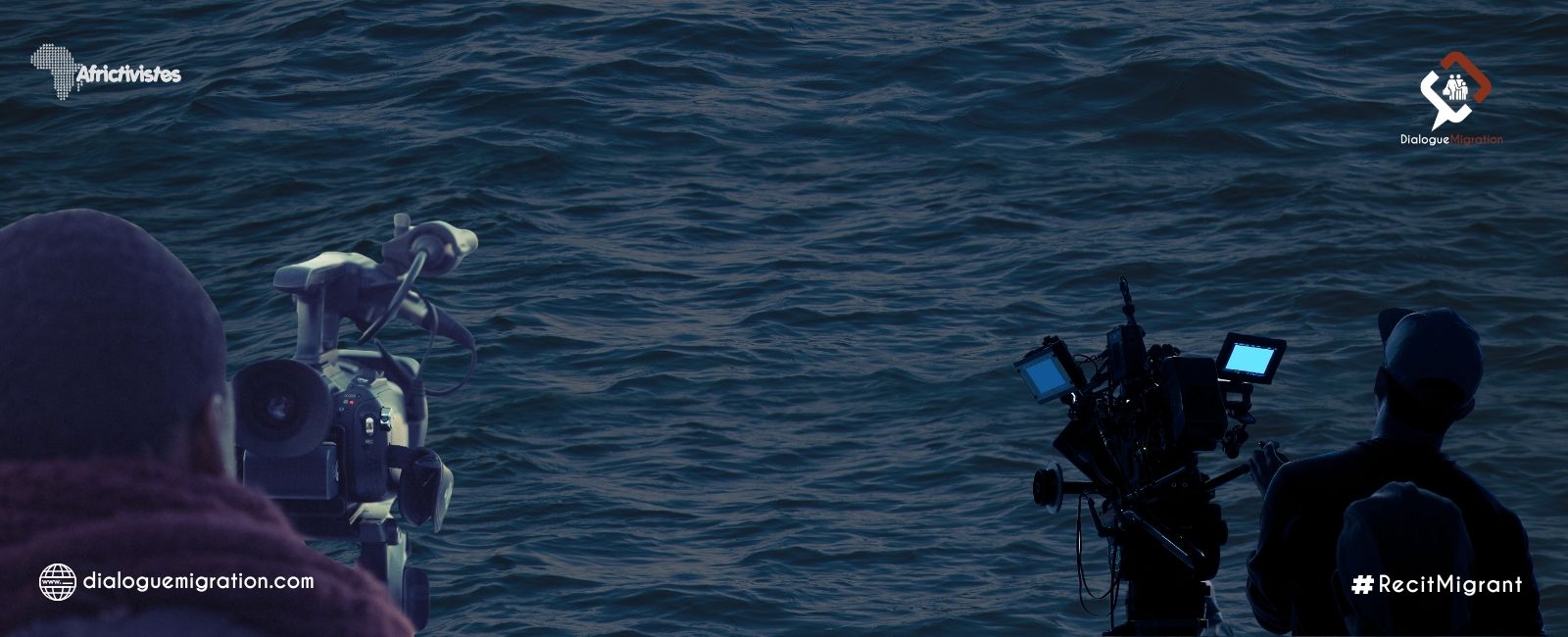

At the bend of countless puddles of seaweed and alleys flooded by rainwater, the Diops’ home is lost in the sinister scenery of the Pikine Sor Daga district in Saint Louis, northern Senegal. For someone who comes to visit for the first time, the geolocation system may not be enough to find the house. You need a guide. And under the hot Saint Louis sun in September 2023, it was the old Sandiery Diop who came to pick up the Dialogue Migration team at the bus stop at the entrance to the Pikine neighborhoud to take them home.
Diop is a family man who finds it difficult to come to terms with the disappearance of people in the ocean. A retired police officer, this man, who is committed to good behaviour and respect for the law, swears on the way to his home that his son would never have taken the canoes for any reason if he knew what was going on. Between two or three anecdotes told about the behavioural excesses of the young people in his neighbourhood and the resignation of parents in education, we arrive on the first floor of the home where the deceased Doudou’s room is located. On her bed, a welcoming mother who coordinates breakfast for her two daughters. More than her stoicism, it is the calm and relaxed manner that punctuates the narration of the drama that strikes her that attracts attention.
As the father’s grief is still raw, it is the mother Oumou Sarr who is in charge of narrating the last moments spent by her son on dry land, his dreams, his projects…
“I thought Doudou had gone to Benin to present his documentary film”
Her legs almost paralyzed by an attack of rheumatism, certainly accentuated by the grief born of the disappearance of her son, Maman Oumou relives the trials that overwhelm her philosophically. With a smile taped to the corner of her lips, a teasing and very joking tone, she jokingly teases the reporter during the exchanges. But did she know that Doudou was planning to take the canoes?
“Let’s just say I had some suspicions because he’d been talking for a long time about his plan to make a film about the sea voyages of his best friend, Babacar. But I never thought he would be able to take the canoe and follow him on his journey,” she confides. Before calling on his eldest daughter to bring the binder in which Doudou kept the synopsis of his documentary film “Daaj Gaal” which proves that he had not gone to sea to emigrate.
By the time she came with the documents, Mrs. Oumou Sarr continued her confessions. “Doudou left the house on August 18. Their canoe left the next day, August 19, I think. When I went two or three days without seeing him and without being able to reach him on the phone, I thought that he had gone to Benin to present his documentary film. He had told me about this invitation to Cotonou. That’s why I wasn’t too worried when the news of their canoe disappearing spread throughout the neighbourhood,” she reveals.
Presentation of the DAAJ GAAL synopsis
In a blue binder that she receives as a precious treasure from the hands of her eldest daughter, Mama Oumou Sarr, pulls out a document of five separate but well-ordered sheets. The famous synopsis that Doudou wrote about the film he was supposed to make about the life of his close friend whom he chose to name Tapha. It is a 13-sequence documentary-film that audiences will never see that took the young Senegalese filmmaker to the Atlantic ocean alongside his best friend.
On the first page, the “Note of Intent” allows us to see through the project of the director of the TV movie “Dépotoir”. He explains almost everything.
“My intention is to tell the story of Tapha, a young migrant who is on his third attempt to reach the Spanish coast in a dugout canoe. I couldn’t help but think that it would be interesting to retrace his journey, which, after having lived through hell, still does not give up braving the sea once again. If despite the accumulated failures, which have serious consequences on his life, and in view of the many human losses at sea distilled in the press, Tapha continues to carry his dream, it is in my opinion that he has already lost his mind or that he no longer has hope in his country. My intention through this film “DAAJ GAAL” translated into French is to show the other side of irregular migration, that is to say from the dream to the project to the travel project stage with its social, psychological, affective, dramatic consequences among others,” reads the first paragraph.
Doudou goes on to describe his character’s internal struggles: ” The other peculiarity of the film, which is the groundswell, deals in a singular way with Tapha’s stubbornness in wanting to defy the waves in the face of a family affected and torn apart, which reveals the dramatic side of itself. The intention is to make a film in motion day and night and to show the main character Tapha in his desires, in his deliriums, in a fight against his own desire to leave, his little family and his fears of never coming back“
It is in the last paragraph of his Note of Intent that the young filmmaker reveals his project to accompany his friend at sea for the making of his film. “My intention is the movement filmed with Tapha, scenes whose setting varies according to the scenery, and mainly the river and the mainland remains a choice of direction, discretion in the actors’ approach, especially the main character, namely Tapha, the chases on the one hand, the police in sometimes muscular interventions against the migrants, sometimes dissuasive. Opposite, this populous district of Sor Dagg, where rumours and suspicions spread in the public square, mingles with the word of mouth of young people who, like Tapha, aspire to take to the sea.”
“His close friend, Babacar, can no longer come into the house without bursting into tears”
If Doudou Diop’s father always recalls the film of his last exchanges with his son before his departure and regrets not having been able to do anything to prevent his adventure on the high seas, the mother Oumou Sarr puts everything down to fate. “A lot of his friends don’t dare hang around anymore for fear of running into me. They know that I’m doing my little investigation to find out what really happened before and during the trip. If Doudou had told me about his project, he would never have taken the canoe,” complains old Sandiéry Diop.
He is cut short by his wife. “It was his destiny. You couldn’t help it,” she retorts to her husband. Before confiding to us the discomfort experienced by Babacar, Doudou’s close friend, since his return from this adventure. “He came here on the day of the funeral, but he immediately left in tears as soon as my youngest son asked him where Doudou was. He is deeply dejected. He left the neighbourhood and became unreachable,” she said.
According to the latest news, Babacar has taken refuge with his grief in Ross Béthio, 50 kilometres from Saint-Louis. Will he attempt a fourth sea voyage to Spain? Nothing is less certain!
Aged 23, Doudou Diop had obtained his degree in Heritage at the Gaston Berger University in Saint-Louis. But he decided to put his acquired knowledge aside to focus on his true passion, cinema. He first trained as a photographer and videographer and then in editing and post-production at the famous Yenenga centre in Dakar. His documentary film “The Dump” was selected at the Porto Novo International Documentary Film Festival.
Sadly, on July 28, the Moroccan navy intercepted a dugout canoe and rescued 71 youths, who claim that 14 people died during the crossing. Doudou Diop was one of them.


